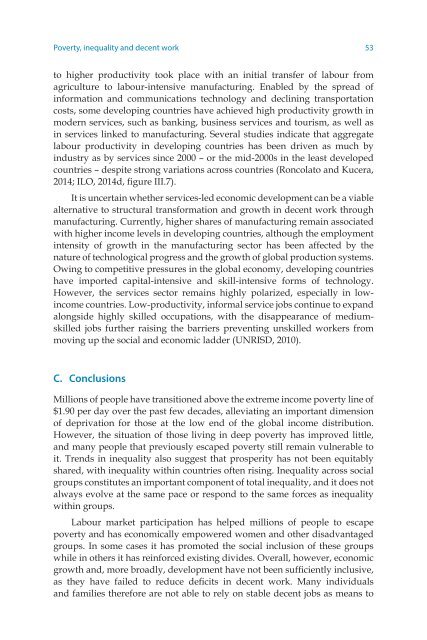Leaving no one behind the imperative of inclusive development
full-report
full-report
Create successful ePaper yourself
Turn your PDF publications into a flip-book with our unique Google optimized e-Paper software.
Poverty, inequality and decent work 53<br />
to higher productivity took place with an initial transfer <strong>of</strong> labour from<br />
agriculture to labour-intensive manufacturing. Enabled by <strong>the</strong> spread <strong>of</strong><br />
information and communications tech<strong>no</strong>logy and declining transportation<br />
costs, some developing countries have achieved high productivity growth in<br />
modern services, such as banking, business services and tourism, as well as<br />
in services linked to manufacturing. Several studies indicate that aggregate<br />
labour productivity in developing countries has been driven as much by<br />
industry as by services since 2000 – or <strong>the</strong> mid-2000s in <strong>the</strong> least developed<br />
countries – despite strong variations across countries (Roncolato and Kucera,<br />
2014; ILO, 2014d, figure III.7).<br />
It is uncertain whe<strong>the</strong>r services-led eco<strong>no</strong>mic <strong>development</strong> can be a viable<br />
alternative to structural transformation and growth in decent work through<br />
manufacturing. Currently, higher shares <strong>of</strong> manufacturing remain associated<br />
with higher income levels in developing countries, although <strong>the</strong> employment<br />
intensity <strong>of</strong> growth in <strong>the</strong> manufacturing sector has been affected by <strong>the</strong><br />
nature <strong>of</strong> tech<strong>no</strong>logical progress and <strong>the</strong> growth <strong>of</strong> global production systems.<br />
Owing to competitive pressures in <strong>the</strong> global eco<strong>no</strong>my, developing countries<br />
have imported capital-intensive and skill-intensive forms <strong>of</strong> tech<strong>no</strong>logy.<br />
However, <strong>the</strong> services sector remains highly polarized, especially in lowincome<br />
countries. Low-productivity, informal service jobs continue to expand<br />
alongside highly skilled occupations, with <strong>the</strong> disappearance <strong>of</strong> mediumskilled<br />
jobs fur<strong>the</strong>r raising <strong>the</strong> barriers preventing unskilled workers from<br />
moving up <strong>the</strong> social and eco<strong>no</strong>mic ladder (UNRISD, 2010).<br />
C. Conclusions<br />
Millions <strong>of</strong> people have transiti<strong>one</strong>d above <strong>the</strong> extreme income poverty line <strong>of</strong><br />
$1.90 per day over <strong>the</strong> past few decades, alleviating an important dimension<br />
<strong>of</strong> deprivation for those at <strong>the</strong> low end <strong>of</strong> <strong>the</strong> global income distribution.<br />
However, <strong>the</strong> situation <strong>of</strong> those living in deep poverty has improved little,<br />
and many people that previously escaped poverty still remain vulnerable to<br />
it. Trends in inequality also suggest that prosperity has <strong>no</strong>t been equitably<br />
shared, with inequality within countries <strong>of</strong>ten rising. Inequality across social<br />
groups constitutes an important comp<strong>one</strong>nt <strong>of</strong> total inequality, and it does <strong>no</strong>t<br />
always evolve at <strong>the</strong> same pace or respond to <strong>the</strong> same forces as inequality<br />
within groups.<br />
Labour market participation has helped millions <strong>of</strong> people to escape<br />
poverty and has eco<strong>no</strong>mically empowered women and o<strong>the</strong>r disadvantaged<br />
groups. In some cases it has promoted <strong>the</strong> social inclusion <strong>of</strong> <strong>the</strong>se groups<br />
while in o<strong>the</strong>rs it has reinforced existing divides. Overall, however, eco<strong>no</strong>mic<br />
growth and, more broadly, <strong>development</strong> have <strong>no</strong>t been sufficiently <strong>inclusive</strong>,<br />
as <strong>the</strong>y have failed to reduce deficits in decent work. Many individuals<br />
and families <strong>the</strong>refore are <strong>no</strong>t able to rely on stable decent jobs as means to
















